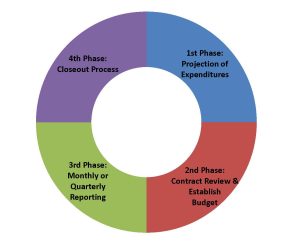Grants & Categorical Accounting
The goal of our Grants and Categorical (G&C) area is to provide assistance in ensuring compliance with federal, state, and local government regulations, laws, policies, and procedures. G&C is responsible for the post-award financial reporting of private and government grants and contracts. G&C also prepares budget appropriations, indirect cost charges, and billings for restricted funds.
Grants & Categorical Workflow Process

Below is a listing of some of the major campus restricted funds:
California Adult Education Program (CAEP):
- The 2015-16 State Budget appropriated $500 million to the California Community College Chancellor’s Office (CCCCO) and the California Department of Education to allocate funding for adult education. The funds will be provided to eligible consortia for the purpose of implementing regional plans for adult education. The intent of the California Adult Education Program (CAEP, formally the Adult Education Block Grant) was to expand and improve the provision of adult education via these consortia. See a listing of allowable expenditures (PDF) for the CAEP grant.
- The CCCCO and the California Department of Education (CDE) are working in partnership to implement the requirements outlined in the CAEP. We will continue to provide guidance and solicit feedback from the field throughout the implementation process.
Child Development Center (CDC)
- The CDC is self-funded through various federal, state, and local awards. Among those currently awarded are: Federal Food Program, General Block Grant, Campis Grant, and Head Start. To fund its many operations the CDC functions with just over $2 million annually.
Disabled Student Program & Services (DSPS)
- The DSPS is all about equity and making sure any student can reach his or her full potential. DSPS assist students with disabilities so they have equal access to all educational programs and activities on campus.
Extended Opportunity Programs and Services (EOPS)
- Extended Opportunity Programs and Services (EOPS) is here to make sure students disadvantaged by social, economic, educational or linguistic barriers get the resources they need to enroll and succeed at any California community college. How? By offering comprehensive academic and support counseling, financial aid and a bevy of other services aimed at keeping students from dropping out and helping them reach their educational and career goals.
Cooperative Agencies Resources for Education (CARE)
- EOPS students who are single parents receiving public assistance can also access the CARE program, an acronym for Cooperative Agencies Resources for Education. The CARE program offers additional support services so students can transition from welfare dependency by securing the education, training, and marketable skills needed for self-sufficiency and upward social mobility.
NextUp
- The NextUp program, also known as Cooperating Agencies Foster Youth Educational Support, is another EOPS program, a program targeting the nearly 13,000 current or former foster youth enrolled in California’s community colleges. Next Up/Guardian Scholars offers a range of services and resources to help current and former foster youth increase their confidence and ability to become successful, college-educated individuals.
Student Equity
- In 2018, the SEA Program was established and merged funding for three initiatives: the Student Success and Support Program; the Basic Skills Initiative; and Student Equity. Integrating these efforts into a single program advances our goal of demolishing once and for all the achievement gaps for students from traditionally underrepresented populations.
Strong Workforce District & Regional
- To develop more workforce opportunity and lift low-wage workers into living-wage jobs, California took a bold step in 2016 to create one million more middle-skill workers. At the recommendation of the California Community College Board of Governors, the Governor and Legislature approved the Strong Workforce Program, adding a new annual recurring investment of $248 million to spur career technical education (CTE) in the nation’s largest workforce development system of 115 colleges.
See a full listing of all grants & categorical funds for the current Fiscal Year.